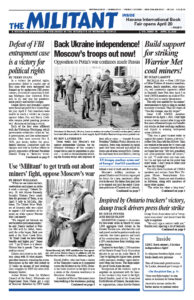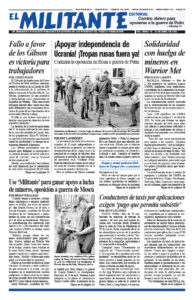In an important ruling for the rights of workers behind bars, the U.S. Supreme Court ruled March 24 that states must accommodate death row inmates who want their pastor to pray aloud or touch them during their execution.
The court ruled 8 to 1 in favor of Texas death row prisoner John Henry Ramirez. He had appealed a decision by a state court upholding prison rules that would require his Baptist pastor to remain silent and away from him as he is put to death. Ramirez argued that this was a violation of his First Amendment freedom to worship.
The state claimed that allowing the pastor to pray out loud or touch Ramirez was a threat to the “safety, security, and solemnity” of the execution. The Supreme Court ruled that there was no “compelling need” for this policy. The court had stayed Ramirez’s execution three hours before it was to be carried out last September to consider the case.
The court’s new ruling allows states to set some limits on what religious advisers may or may not do. “If the adviser is to touch the prisoner, the state might also specify where and for how long,” wrote Chief Justice John Roberts.
Judge Clarence Thomas dissented, arguing Ramirez was being rewarded for gamesmanship to delay his execution.
The decision “stresses the importance of religious liberty and religious practice for everyone,” Ramirez’s pastor, Dana Moore, told the press. Since Moore became his pastor in 2016 they have had no physical contact, so the first and last will be in the execution chamber. They speak through telephone handsets on either side of a thick plexiglass window and pray by pressing their palms against the window.
Inmates like Ramirez “are in solitude all the time,” Moore told the New York Times last fall. “The only time they are touched is when the handcuffs go on and when the handcuffs go off.”
Ramirez, 37, has been on death row since 2009 after being convicted of stabbing to death convenience store clerk Pablo Castro in 2004. He was seeking money to buy drugs and took $1.25 from the clerk’s pocket.
“Mr. Ramirez takes responsibility for the crime, which he calls a ‘heinous murder,’” reported the Times. In prison he has become a voracious reader, writes poetry, draws and writes letters to supporters.
In 2019 in another Texas case, the Supreme Court blocked the execution of Patrick Murphy when prison authorities would not allow his Buddhist priest into the execution room, even though the prison employed Christian and Muslim advisers. Texas responded by barring all clergy from the death chamber.
In 2021, as more inmates filed lawsuits, the state changed its policy to allow outside religious advisers in the chamber, but banned them from speaking or touching the inmate.
There is growing opposition to the death penalty among working people and an increasing number of state governments have abolished it.
“The death penalty and solitary confinement are weapons to terrorize and intimidate working people by the capitalist ruling class,” Alyson Kennedy, Socialist Workers Party candidate for governor of Texas, told the Militant. “The U.S. rulers incarcerate a higher percentage of the population than any other country in the world. The Socialist Workers Party calls for the abolition of both the death penalty and solitary confinement.”

